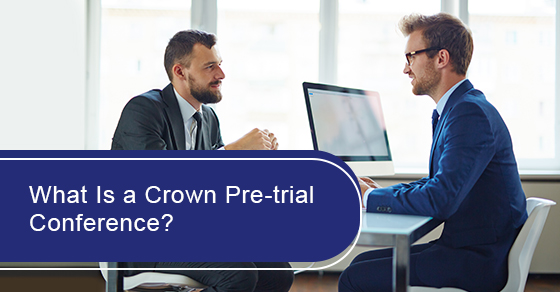What Is a Crown Pre-trial Conference?

Blog by Arun S. Maini
My lawyer tells me that he will discuss my case with the prosecutor at a Crown Pre-trial Conference. What is a Crown Pre-trial Conference?
A Crown pre-trial conference, also known as a “Crown pre-trial” or “CPT”, is a meeting between the Crown attorney prosecuting your case and your criminal defence lawyer. The JPT is one of the key opportunities for the parties to discuss the case.
When and how does a Crown pre-trial take place?
A Crown pre-trial conference normally takes place after your lawyer has reviewed the evidence and discussed it with you. Each courthouse follows its own procedure, but typically it involves scheduling a meeting with the Crown assigned to the case. If there is no assigned prosecutor, the meeting will be held with the Crown who is assigned to conduct CPTs on that particular day.
The meeting will take place by phone, although there is occasionally the option to discuss the matter in person. The in-person option is a lot less common now than it was before the COVID pandemic.
Can I be present at the Crown pre-trial?
No. If you have a lawyer, the discussions will take place between the Crown and your lawyer. The reason for this is to permit the lawyers to use their combined knowledge and experience to discuss issues off the record. Such a free-ranging and confidential discussion allows the parties to be open and honest about the case, thereby encouraging resolution of the issues. If such discussions took place in a more public forum, such as open court where there is a recording made, the parties would likely censor and limit their conversations because they are not private. And if the client was present, the Crown would naturally limit what they say in order not to give offence or create any misunderstandings.
What if I don’t have a lawyer?
If you don’t have a lawyer, then your discussions with the prosecutor will be more limited because the Crown cannot risk a dispute between you and them about what was said at a meeting. In such a case the prosecutor could end up as a witness in their own case, which creates a real problem. If you don’t have a lawyer, then there are a few options for an exchange of information: either comments are made on the record in court; through the duty counsel legal aid service, which provides some limited assistance to unrepresented defendants; or through email, which provides a written record of what was discussed.
Is there only one chance at persuading the Crown at a pretrial?
No. After the initial Crown pre-trial, there are usually several other follow-up discussions with the prosecutor to resolve ongoing issues. In addition, as part of the negotiation process, there is the option to involve a judge in the discussions, a procedure known as a Judicial Pre-trial Conference, or JPT. The JPT can be a very effective way to resolve differences between the Crown and defence. See our companion blog on JPTs here .
What topics are discussed at the Crown pre-trial?
At the CPT, the Crown and defence will discuss any issues that are relevant to that stage of the proceeding. At the first meeting, the topics usually relate to the disclosure of evidence and setting out the positions of the parties for the negotiations. For example, does the Crown view this case as a serious one requiring a severe penalty? Or one in which they are prepared to be flexible or lenient in order to encourage a resolution? Is it a case where the Crown sees a conviction as being necessary? Or can the matter be settled without the need for a guilty plea, such as through diversion or a peace bond?
Other topics will depend on what the issues are, relating to evidence, resolution, or how long a trial will take.
What if the Crown is being unreasonable? How do you handle negotiations then?
There is always the chance that a prosecutor may be inflexible or unwilling to budge from a strict position. In most instances, however, because the courts are so backlogged, prosecutors cannot afford to be inflexible and will respond to well-supported defence submissions. Sometimes, their firmness is due to strict Ministry policies or guidelines, such as with sexual assault.
If your lawyer finds that it is difficult to make headway on certain issues in the Crown pre-trial process, a Judicial Pre-trial Conference will usually be the next best step to take in order to try to resolve those differences.
The Crown pre-trial is an essential step in the legal process when defending against a criminal charge. If handled properly, it can secure a resolution that satisfies the client, while minimizing the cost and time needed. It also allows you and your lawyer to have some measure of control over the process, which you give up when you leave the final decision in the hands of a judge at a trial.
Arun S. Maini at the Defence Group has over 25 years of experience as a criminal defence lawyer. If you or a loved one are facing criminal charges and need the advice of an experienced and skilled lawyer to help you through the legal process, call The Defence Group for a free consultation at 877-295-2830 or email us through the Contact Us link throughout our website.

